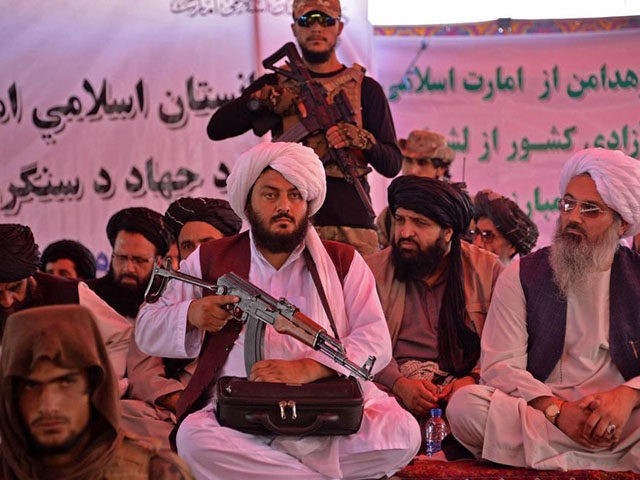A spokesman for the “finance ministry” of the Taliban told Reuters in remarks published Friday that the terrorist group needs “fresh funds” to maintain its control of the country.
“The money belongs to the Afghan nation. Just give us our own money,” Ahmad Wali Haqmal, the spokesman, urged, addressing states and international financial institutions that have frozen Afghan government assets to prevent the Taliban from controlling them. “Freezing this money is unethical and is against all international laws and values.”
Haqmal admitted the Taliban takes in about $4.4 million in taxes from civilians on a daily basis, but insisted the money is not enough and, without the billions in central banks around the world that rightfully belong to the Afghan government, the Afghan people will face an even more severe humanitarian crisis than the one they are currently enduring.
The Taliban, a Sunni jihadist terrorist organization with links to al-Qaeda and other similar groups, seized power in Afghanistan in August, taking over the capital on August 15. Taliban terrorists launched a campaign to take over the country in April following the decision by President Joe Biden to extend America’s 20-year war in the country through September. Ultimately, Biden withdrew all troops in August, before his artificial deadline but three months after Washington had agreed to leave under a deal brokered by former President Donald Trump.
“Now as the agreement is being breached by America, it in principle opens the way for the Mujahideen of Islamic Emirate to take every necessary countermeasure,” the Taliban asserted in a statement in April.
In response to the Taliban’s seizure of Kabul, the capital, major international financial institutions froze Afghanistan’s government assets – most prominently the International Monetary Fund (IMF) and the World Bank. The Taliban, thanks to intervention by the United States, also has no access to nearly $10 billion saved in the Afghan Central Bank as of September.
Haqmal reportedly told Reuters that the Taliban promised to respect human rights in the country despite its decades-long record of bombings, torture, and repression of women. That history is what the international community has cited as its reason for denying the jihadists money.
Reuters spoke to a board member at the Afghan Central Bank, Shah Mehrabi, who confirmed that “the situation is desperate” for the Taliban. The nation needed $150 million a month just to stave off an “imminent crisis,” he warned.
“If reserves remain frozen, Afghan importers will not be able to pay for their shipments, banks will start to collapse, food will be become scarce, grocery stores will be empty,” Mehrabi said.
No state actor has recognized the Taliban as the official government of Afghanistan. Neighboring rogue states China and Iran began to refer to the terrorist group as a “caretaker” or “interim” government this week, however, and a joint statement signed by the two countries, Russia, and Central Asian states described the Taliban’s rule as a “reality” the world must accept.
“[F]urther practical engagement with Afghanistan needed to take into account the new reality, that is the Taliban coming to power in the country, irrespective of the official recognition of the new Afghan government by the international community,” the statement read.
The Taliban’s top spokesmen have repeatedly and enthusiastically stated that the group seeks to be treated as a universally recognized legitimate government.
“We want all countries in the world, including the United States, to recognize us,” spokesman Zabihullah Mujahid said in August. “We are part of the world. We assure you that the soil of Afghanistan will not be used against any country or anyone.”
The spokesmen have not been sky in stating the goal of that legitimacy is to receive access to Afghan government coffers.
“We need the reconstruction of Afghanistan, the people of Afghanistan need the budget. The [central bank] shall need the budget,” spokesman Suhail Shaheen told the Chinese state network CGTN in August, calling the IMF and World Bank’s move to freeze assets “an injustice.”
Shaheen issued a more desperate plea on Friday.
“The winter is around the corner, so there is an immediate need for the international community to urgently disburse the recently announced nearly one billion euro aid package pledged at a virtual G20 summit for Afghanistan, to all poor, vulnerable and displaced people,” Shaheen said, according to the Afghan agency Tolo News.
The institutions have expressed concern the Taliban would use the money to repress Afghan civilians.
“We are deeply concerned about the situation in Afghanistan and the impact on the country’s development prospects, especially for women,” World Bank spokeswoman Marcela Sanchez-Bender said. “We have paused disbursements in our operations in Afghanistan and we are closely monitoring and assessing the situation in line with our internal policies and procedure.”
The Biden administration insisted through its State Department in September that it would was not offering “any assistance to the Taliban or any part of the government of Afghanistan,” according to a report published by the Special Inspector General for Afghanistan Reconstruction (SIGAR) on Friday.
On Thursday, Secretary of State Antony Blinken announced the Biden administration would allocate $144 million to Afghanistan for “humanitarian aid.” Afghan news agency Ariana News reported that the administration stated the funds would explicitly go to United Nations agencies, among others, “including the United Nations High Commissioner for Refugees (UNHCR), United Nations Children’s Fund (UNICEF), International Organization for Migration (IOM), the World Health Organization (WHO).”
UNICEF, the W.H.O., the World Food Programme (WFP), and other United Nations agencies have, however, reportedly collaborated with the Taliban, indicating those funds would not necessarily remain out of jihadist hands. A group of Afghan women protested in front of U.N. headquarters this week against the international agencies’ silence in the face of the Taliban’s ongoing ban on girls’ education and women in workplaces.

COMMENTS
Please let us know if you're having issues with commenting.